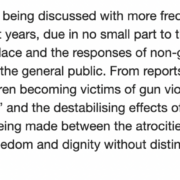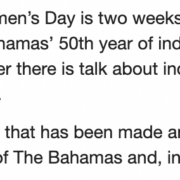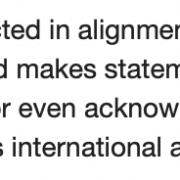THERE is always a crisis somewhere, and when there is a crisis anywhere, there is a crisis everywhere. This is the nature of the world, given the way that the global economy, geopolitic, and interpersonal relationships work on their own and are connected with each other. Crises, however discreet they may appear to be, are also interconnected. Discussed as though they are about one issue or another, armed conflicts are usually started to gain control of resources, destabilise economies, and/or oppress and subjugate people. The latter two are usually connected to the desire to steal, control, and profit from resources.
Some crises make it to the news while others are ignored, deemed less important, impactful, or relevant. Sometimes it is about the direct effect of crisis in one or two countries on the rest of the world and how much we depend on them for necessities. Sometimes it is about the people involved and how human the rest of the world considers them to be.
Everyone knows that there is a conflict in Ukraine, though everyone who is aware of it may not understand and discuss it as a war being waged by Russia.
We have seen footage of the violence against people and destruction of property. We have heard from the people who fled of the absence of choice and the will to survive which led to the separation of families. Ukrainian people have been forced to go to other countries that, thankfully, rightfully, accept them as refugees. They, in many ways, have to learn new ways of life, and they face the difficulty of deciding in which ways they should assimilate and in which ways they can and should maintain their culture. They balance the maintenance of their collective identity with living as comfortably in community with a receiving country. Language and food, of course, are integral to cultural identity, and are both the easiest and most difficult aspects to maintain when a minority in another country. Many have pointed to the targeted destruction of museums, galleries, and other cultural sites — clear attempts to wipe out every trace of Ukrainian cultural. This — all of it— is genocide. This is a war on people, on their culture, and on their history.
Everyone knows that there is conflict in Palestine, and particularly in Gaza, and there are different narratives about it, so not everyone acknowledges that it is genocide.
Some understand that Israel has inflicted violence upon the Palestinian people for decades, displacing them, trapping them in open-air prisons, and killing them. Some are unaware, and maybe uninterested, in the history of this crisis and the human rights violations by Israel against Palestine.
The same must be said here:
We have seen footage of the violence against people and destruction of property. We have heard from the people who fled of the absence of choice and the will to survive which led to the separation of families. Palestinian people have been forced to go to other countries that, thankfully, rightfully, accept them as refugees. They, in many ways, have to learn new ways of life, and they face the difficulty of deciding in which ways they should assimilate and in which ways they can and should maintain their culture. They balance the maintenance of their collective identity with living as comfortably in community with a receiving country. Language and food, of course, are integral to cultural identity and are both the easiest and most difficult aspects to maintain when a minority in another country. Many have pointed to the targeted destruction of museums, galleries, and other cultural sites — clear attempts to wipe out every trace of Palestinian culture. This — all of it — is genocide. This is a war on people, on their culture, and on their history.
What does the repeated use of these tactics tell us about these wars and the people waging them? What do they say about the intent of the people behind them? What about the common suggestion that it is “just about land”?
It is easy to throw our hands up. We can come up with countless excuses that amount to:
-
We are too far away.
-
We do not understand.
-
We are suffering too.
Whatever the excuses we can find to absolve ourselves of any responsibility for each other, within and across borders, global solidarity is critical. This has been rather difficult to build, but it is happening. One of the main gaps is the low capacity to care.
It is not always that people do not care. Sometimes people do not want to care, so they choose to ignore. Sometimes people do not know why they should care, and they actively work against the human instinct to be interested in the welfare of others. So many of us are tired, struggling, and tired of struggling. Moving from one day to the next can sometimes feel as though we ourselves are turning the massive, heavy hands of time, and that our running feet are what make this planet spin. The burden heavy, the pressure tall, we press on in our daily lives, concerning ourselves with what is immediately in front of us. Sometimes, being asked to care is taken as an affront. It is not that we should be blamed for these circumstances, considering that we are operating within a system that has been designed and maintained for this purpose — self-destructive individualism, hyper-focus on survival, perpetual exhaustion, and a seemingly necessary disinterest in what takes place outside of our own bubbles.
Our pushback against this system, while we are in it, has to be intentional, collective, and unrelenting. We have to choose to be attentive —watching, reading, and listening to the news. This on its own, of course, is not enough. We have to be media literate, assessing the credibility of our sources of information and being critical of the way the information is a delivered. Does the source have a clear position on this issue? What does the source want us to believe? Who has been quoted, and what other sources have been mentioned? What do the people behind this piece want us to do, and why?
One source is not enough for us to be able to make a decision on an issue. It is important to go to multiple sources, draw comparisons, note the contrasts, and verify the information. Are the stories firsthand, coming directly from people who have directly experienced the event? Is it a retelling of someone else’s story? Is there evidence to support the secondary data? What do the photos, video, and audio indicate? Could they have been manipulated in any way? Separate the facts from the opinions and apply the evidence.
After accessing and assessing the information for credibility, it can be helpful to discuss it with others. What do other people think about the news? Have others found other sources of information or completed assessments that we have not yet done? Do people tend to take one side over another? Why?
There is often one side that gets more support, and this does not necessarily mean that it is the right side. In many cases, the conservative viewpoints get more attention, both from media and from the people around us, because their talking points are generally the same and their positions are often so divisive that the media wants to run multiple stories over a long period of time, if only for the shock value that leads to more purchases and clicks. The people who call for human rights, dignity, peace, and equality are often left to play catch-up, responding to the hateful rhetoric and misinformation spread by other people. It is important to pay attention to what is being said on all sides and to identify the intent behind all of the messages. It is not sufficient to know the opinions people hold. Find out why they think, say, and do whatever it is they do. Assume less. Ask questions, challenge positions, and determine why you stand where you do.
Where are people being valued, championed, and protected? Where are systems and institutions being held up as more important than human life? Who is expressing concern and demonstrating care for the people most vulnerable to violence, destruction, oppression, and murder? Who is dehumanising people, using gender, race, socio-economic status, age, and other identity markers to “excuse” what is happening to them?
With information, opinions, and the intent behind them, we are better equipped to find our own positions on issues. Once we do, in order for it to mean anything, we have to take action. This does not mean we need to enter conflict zones or become participants in wars. Being relatively safe, we are able to speak up. We can talk to family members and friends about what is happening elsewhere and help them to understand who the victims are and how we can support them. We can make donations to organisations that are activated, especially on the ground and in receiving countries, to meet immediate needs, including food, water, and medical care. We can engage political leaders and other people of influence, sharing our positions and our expectations of them as they participate in conversations and decision-making processes with regard to the crisis. We can use our platforms, including social media, to share information and encourage others to act. Small acts matter. What is most important is that we take action based on our own capacity, and that we seek to increase that capacity by challenging ourselves and the systems that limit our ability and willingness to participate.
Interested in learning more about Palestine? Check out the list of 40 books at https://lithub.com/40-books-to-understand-Palestine.
Published in The Tribune on November 15, 2023









Leave a Reply
Want to join the discussion?Feel free to contribute!